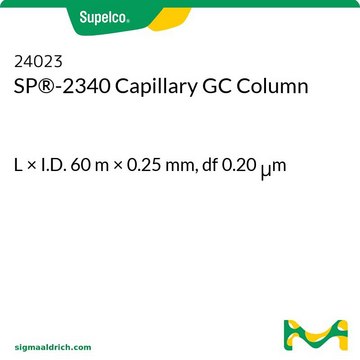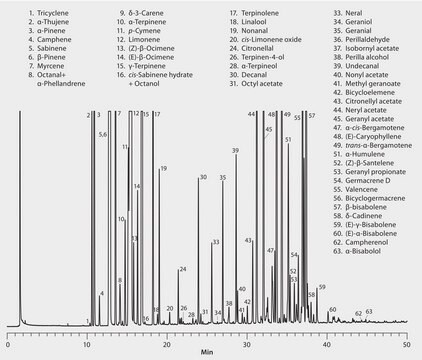24110-U
SP®-2380 Capillary GC Column
L × I.D. 30 m × 0.25 mm, df 0.20 μm
Synonim(y):
GC column, biscyanopropyl siloxane
About This Item
Polecane produkty
Materiały
fused silica
agency
meets requirements for USP G48
Parametry
≤25-275 °C temperature (isothermal or programmed)
Wartość beta
313
df
0.20 μm
metody
gas chromatography (GC): suitable
dł. × śr. wewn.
30 m × 0.25 mm
grupa aktywna macierzy
Stabilized; poly(90% biscyanopropyl/10% cyanopropylphenyl siloxane) phase
Zastosowanie
agriculture
chemicals and industrial polymers
clinical
food and beverages
typ kolumny
capillary highly polar
Szukasz podobnych produktów? Odwiedź Przewodnik dotyczący porównywania produktów
Opis ogólny
USP Code: This column meets USP G48 requirements.
Phase:
- Stabilized
- Poly(90% biscyanopropyl/10% cyanopropylphenyl siloxane)
- Subambient to 275 °C (isothermal or programmed)
Zastosowanie
- SP®-2380 Capillary Column may be suitable for determination of fatty acid composition in crude oil using capillary gas chromatography, used along with normal and reverse-phase high-performance liquid chromatography (HPLC) in order to study the content and composition of tocopherols, sterols, and phospholipids in soybean oils derived from genetically-modified soybeans.
- It was also found suitable to be used for the identification of fatty acid methyl esters from mammalian samples by fast gas chromatography.
- Furthermore, it is also suitable for determining the hydrogenation level and the level of isomerisation development during the hydrogenation process of edible oils by capillary gas chromatography.
- Above all that it is also suitable to be used in gas chromatography equipped with flame ionization detector (FID) for analysing the cytotoxicity of fatty acids from seed oils containing conjugated linolenic acids (CLN) on mouse tumor and human monocytic leukemia cells.
Inne uwagi
Informacje prawne
Wybierz jedną z najnowszych wersji:
Masz już ten produkt?
Dokumenty związane z niedawno zakupionymi produktami zostały zamieszczone w Bibliotece dokumentów.
Klienci oglądali również te produkty
Nasz zespół naukowców ma doświadczenie we wszystkich obszarach badań, w tym w naukach przyrodniczych, materiałoznawstwie, syntezie chemicznej, chromatografii, analityce i wielu innych dziedzinach.
Skontaktuj się z zespołem ds. pomocy technicznej




